#coding class is KILLING me
Text
Can I give up on life and just go on a shopping spree?? Bonus points if I have a rich husband to come with me😭💔😭💔


#genie talks#hello kitty#hello kity aesthetic#coding class is KILLING me#like how is my teacher qualified to teach???#he has no idea what the hell he's saying
8 notes
·
View notes
Text

did I spend 20 min making this instead of actually working on my thesis? yes
13 notes
·
View notes
Text
anybody wanna nominate themselves to kill me with hammers?
#somehow the week of spring break is my most incredibly busy week with work. KRILLS MYSELF!!#im on our colony care rotation. im doing my grant experiment that takes 3hrs a day. my TA prof wants me to grade a shitton of stuff. my PI#was like can you get an updated draft to me by wednesday? ^_^ gonna have to tell him no fucking way tomorrow#bc we are also having a fucking forensics meeting#i wanted to go on another bug catching trip with a friend on wednesday but idk if ill be able to now :(#and i wanted to have a wine and cheese night. no fucking way im gonna feel up to hosting that this week#i was supposed to have an appointment this last wednesday. lady cancelled last minute and said how about monday (tomorrow)? and i thought#that would be fine. but i just had to text and be like hey sorry dont think i can#im probably forgetting something too. who fucking knows.#i wanted to clean my room bc its looking like the fucking labyrinth trash lady zone in there but fuck me i dont have the energy to#oh edit from one minute later. just got an email from my prof abt an assignment he wants us to do over spring break in my horrid fucking R#coding class. yeah im killing myself 😁👍🏻
5 notes
·
View notes
Text
why the fuck does a SINGLE research article cost as much as one of my uni textbooks
#I got a textbook for $35 for a class#this SINGLE STUDY cost $40 for 24 HOUR ACCESS#I will kill#I tried searching for other publish sites#fucking with the code. bypass paywall extensions and sites.#this study isn’t anywhere else!!! and I can’t get it!!! and it might actually be the ONE SOURCE THAT HELPS ME#I’m not fucking paying for it I’d rather eat cement and die#sorry for complaining on your dash#sorry for clogging your dash
7 notes
·
View notes
Text
classes that force you to purchase online access to a third party "learning tool" in order to do required coursework i wish you a very fucking kys
#was going to just drop this class at this point bc the TWO HUNDRED SEVENTY DOLLARS of E TEXTBOOKS haven't sent me access codes.#after a fucking WEEK#but! it appears that every bio class requires this no matter which instructor you have! so actually OSU as a whole should kill itself#like I literally got physical books in the mail for my other classes within 3 days of ordering. what the fuck is happening at the bookstore
3 notes
·
View notes
Text
.
#okay for once I am not ranting from rock bottom#but I did a lot of good coding in RStudio today#the bad part of that is I’m trying to tidy up the old Vulcan dictionary I used for my Semantics and Morphosyntax papers#this data is SO MESSY I cannot believe it#trying to get it to the point where R will even LOOK at it without being like ‘OH MY GOD THERE’S AN UNEXPECTED ITEM IN A PLACE’#NO I WON’T TELL YOU WHERE. I DON’T KNOW WHAT’S GOING ON’ is like. pulling teeth#RStudio is a toddler I swear#it’ll be like ‘No! I wanted mashpotato! this not MASHPOTATO!!!’ and throw a fit until you put a comma in the right place#and then suddenly it’s like ‘Oh! ok! I eat this instead of mashpotato!!’ and you’re like???????!:!#anyway I’ve finally gotten the data so that R finds it readable and started isolating single values per cell#but insodoing some of the new columns I made have values that need to be in their own columns#like I have a column that has part of speech data mixed in with semantic domain data & other stuff#so now I’m going to have to do an if { loop#guess what we never covered in class? .-.#And since my professor is useless I will have to learn how to do if { loops by myself#OH and there’s bits of this table I may end up having to separate out then pivot then re-integrate#guess what else we never covered in class? .-. .-.#yup. so now I have to learn how to do pivot tables by myself#it’s either learn how to do these things on my own or find a work around that’s so jury-rigged it’ll never be reproducible#*heavysigh* I will figure this out even if it kills me
1 note
·
View note
Text
my favorite past time is “was all of this for nothing?” where i take what little of the language im learning and try and shittily translate something to myself.
this time it didnt go to bad! i actually could decipher(?) some characters!
kinda proud i didnt have to stop and think
#谢 will always ALWAYS be one of my most hated ones.#i could reconize ir but i think thats bc of how much i had to practice bc it KILLED ME#srsly i STRUGGLED (praying i dont forgor it again)#its called ‘was all of this for nothing’ purely bc of how many times ive tried to learn languages only to fail 😭#(by fail i mean lime give up)#((Cough coufg FUCK DUOLINGO its shit. i wish years back i couldve seen that. i wasted SO much time))#((ESPECIALLY WHEN IT TOOK LIKW 2 GOOGLE SCEARCHES TO FIND FREE CLASSES THAT ARENT ABSOLUTELY SHIT))#((ok maybe rhe mp3s arent the best but i can still understand whats being said.))#((speaking of i really need to do that fuck. uhhhh i mean i dont plan on finishing the sewing tonightttt soooo))#(((thatd code for “i dont wanna finish sewing bc i started because i didnt wanna draw))) alr ill shut up now
1 note
·
View note
Text
...
#The way I met my bestie has to be the most loser bromantic way ever...#I think she was my classmate who kept staring at me#I could feel her eyes literally digging into my back. She would constantly compliment my eyes every time we spoke#Tbh I felt very scared of her I swear at some point I thought she wanted to kill me and guage my eyes out#Everytime I looked around the class she'd wave and smile at me and I'd shudder#We properly met wehn we had coding class together and I was so scared but since we had to do this I struggled onwards#Turns out once we talked she was the coolest person ever!!! She just thought my eyes were super incredibly pretty#Now I wish we still lived in the cities so hold hands again :'(#Snifff#Can u tell that I miss her ??#Sniffffff
0 notes
Text
THE 10 STAGES OF GENOCIDE, AND HOW FAR PALESTINE IS ALONG WITH THEM
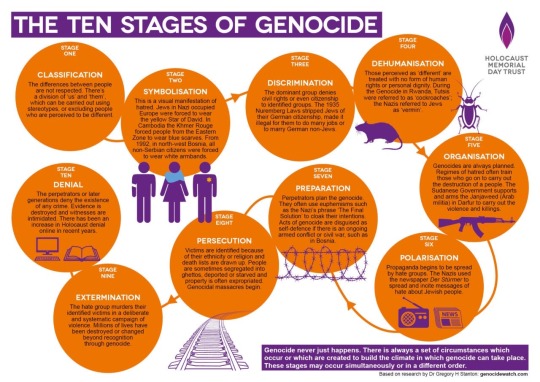
This will be using the UN's ten stages of genocide map (as seen above) as a base for each stage.
So far, palestine is within its ninth stage of genocide.
*although I do not believe isreal is a real or valid country, this will be referring to its citizens as "isrealis"
First Stage: Classification.
This stage is about us and them narratives. In the Holocaust it was Jewish vs Germans, in this it is Palestinians vs israelis.
The ‘us vs them’ narrative has been drilled into young israelis' minds for decades and has only gotten worse.
Second Stage: Symbolism
I do not believe there are any symbols to tell an israel apart from a Palestinian person.
Most of the time it is based off their religion, however not all Palestinians are Muslim nor are all israel Jewish.
Instead of symbols, they segregate.
Third Stage: Discrimination
This stage is about taking things away from their target group. israel has taken away their housing, their land, and their property as seen in the west bank.


Fourth Stage: Dehumanisation
Dehumanisation refers to distancing the target group from humans, and making people less inclined to empathize with them.
israel refers to Palestinians as both animals and derogatory words such as "whores" or "monsters."

Fifth Stage: Organization
This stage is about planning the genocide, and training.
Many israeli students are taught in order for them to grow up and become IDF soldiers. They are taught how to kill without remorse and enjoy it.
Sixth Stage: Polarisation
Polarisation is about the media and spreading hate about their target group in media.
The IDF not only go on international TV and talk about palestinian "terrorists" but also spread misinfo on social media.
(see this post)
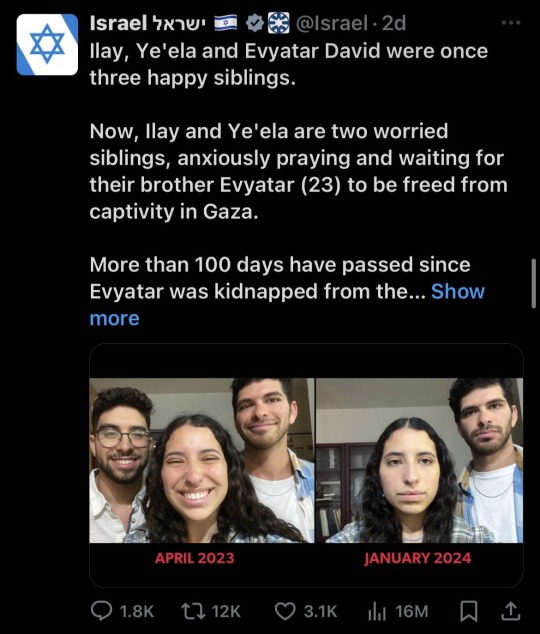
Seventh Stage: Preparation
When preparing perpetrators use code words in order to make their intentions seem brighter.
israel calls it "land disputes" or "self defense" when it is a genocide fueled by colonialist ideologies.
Eight Stage: Persecution
Persecution is about rounding up their target group and committing mass killings.
israel has rounded Palestinians up into Gaza, an open air prison, and continues to bomb their homes, shelters, and hospitals.
There is nowhere for palestinians to go.
Stage Nine: Extermination
This is the stage we are on. israel is destroying hospitals, relief centers, communities, and families.
They are attempting to find and kill every palestinian. Class of 2024 has been canceled due to all students dying.
This cannot continue.
Stage Ten: Denial
If we continue to let israel kill off Palestine, we will get here. To the point where zionists will deny the genocide entirely.
SPEAK UP. DO NOT LET IT COME TO THIS.
Thank you for reading. The original post can be found under the Twitter/X account @aligaytor_. OP has given me permission to share it to Tumblr.
#palestine#palestine news#from the river to the sea palestine will be free#free palestine 🇵🇸#i stand with palestine 🇵🇸#free palestine#news on gaza#save gaza#gaza genocide#free gaza#gaza#gaza strip#gazaunderattack#i stand with palestine#stand with gaza#genocide#info post
7K notes
·
View notes
Text
bye im thinking about dangan!iako again always trying to commit a murder of her own but sb getting to it first every single time
#ITS SO FUNNY TO ME#sorry iako youre your class's antag therefore no kill only annoyance#;sir this is my emotional support dog coded antag. (ooc)#danganronpa tw
1 note
·
View note
Text
mayhaps pizza will fix me
#these coding classes this quarter are gonna kill me.......#i already feel dumb and like i can't do this and i KNOW it's because i'm not automatically getting it which bothers me but ughhhh#my head hurts now from all the complicated medical jargon i just had to try and understand for the last 3 hours and i didn't do a great job
0 notes
Text
I know they’re probably not going to go into this (which i understand, there’s only so much time in an episode and they’re telling a different story) but I think about Al’s background a LOT. Get ready if ur in the mood for a read.
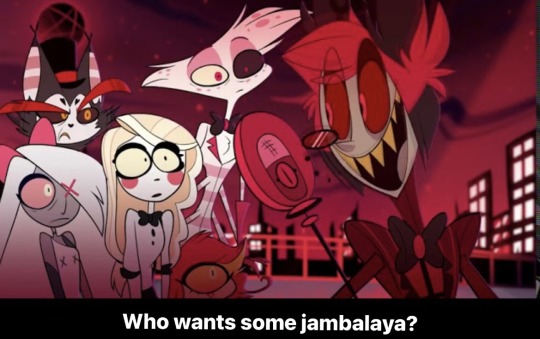
To be a mixed Black person in America is a…bizarre experience. You come to realize that due to the coincidence of your genetic makeup, white folks may divulge information that they keep so closely guarded from the ears of “more obvious-looking” black folks. Im gonna bring it back to Alastor, but lemme give some personal context. I’m mixed with Filipino, so I’m pretty obviously not white, yet my ambiguous ethnic makeup in a predominantly white suburbia seemed to make white peers and people feel much more at ease in relaying their criticisms or prejudices of black people to me. I would hear someone feel comfy enough to spew vitriolic racist shit with me, then toe the line like a circus acrobat when around someone a few shades darker in skin tone and a few coils curlier in hair texture. It was constantly infuriating and holding my tongue was a practice to both investigate someone’s true nature and preserve my own safety. I did abandon that method of navigating life in America, and experienced the switch-up white folks made when I started ‘broadcasting’ my blackness. (E.G. beyonce pre vs. post Lemonade). The criticisms and prejudice confessions just came less often, til I saw them being caged up completely after white peers experienced backlash from me. After they realized “OH this bitch is a n*****!?”
Now this is from someone who is brown, but i also wanna talk about my white-passing cousin with a similar racial makeup as Al, who is from the south and oh BOY. (Let’s call him J for this post’s purposes). J’s navigation though simple daily life is such a constant contradictory experience, of which he is still working through in therapy. I think of one moment when he was manager at retail gig and his boss told him that whenever a Black customer enters, it’s policy to give them “exceptionally attentive customer service”. Essentially, “follow that n***** around”. This is just one modern incident of when J would hear the quiet part out loud, despite his Blackness, because his appearance was white enough to make white folks drop their guard. Eventually, my cousin and I took to the same direction where we used our advantage of disarming white folks against them when the time came. We would keep note and record of racism and unlock a sort of “this you?” when the opportunity to expose that person’s true nature came. It’s pretty vengeful thinking ngl, but it is really REALLY hard to resist exposing an asshole rather than attempting to teach an asshole to change their ways. Especially given that such an attempt is an ARDUOUS uphill battle. The experience of KNOWING the truth about what someone thinks of your people, and being opened to opportunities and information that you would not have access to if the chance of your genetics was only slightly different is bIZARRE, horrific, and fuel for constant inner turmoil. (It sucks y’all)
Now back to Alastor; to have been a mixed person in the Deep South in 1930s America—it’s not too difficult for me to imagine how traumatic and convoluted that experience must have been. Especially when legally and socially, things were so much more Black and White. And when you’re on the line in between that, when society does not prepare a place for your existence, it can be SO isolating. You may consider the absurdity of such an arbitrary method of determining class, status, and/or caste much earlier in life than peers, which only further isolates you. You hold a resentment of society now that you know exactly how the other side is operating to ensure your oppression.
And then I think of Al’s weird ass moral code. How he arrived in Hell and (according to Mimzy) began killing overlords with reckless abandon. This is someone who likely had to develop the cunning to navigate 1930s Deep South America as a mixed, murdering, psychopath without getting caught by authorities who are already gunning for you. And now he is in Hell where the rules of society have gone up in smoke and he can fully embrace his rage, resentment, and vengeance. A desire to burn down the powerful people of the world can be accommodated and ANY previous inhibitions can finally be released. The morality of rising above someone by cutting them down (instead of developing emotional/spiritual healing) has become the easier and satisfying option. Finally the opportunity to show the power-secure villains of the world how easily you can tear them down when nothing is holding you back any longer.
TLDR; The trauma of racism in America is pretty sufficient cannon fodder for a severe psychotic break, the development of socially debilitating behaviors and isolation, and a quest for profound vengeance. So maybe that can explain some of the enigma that is Alastor.
And this is just ONE facet of Al. I didn’t even get to bring up the isolation that comes with being an aroace nonbeliever in the 1930s Deep South. Like FUCK. I’m a mixed, aroace nonbeliever from a modern day conservative town and yall….what a weird experience for sure lol but anyway lemme get back to my life. Whole point of this was—-WHAT AN INTERESTING FUCKEN CHARACTER TO THINK ABOUT
#hazbin hotel#alastor#hazbin hotel spoilers#it’s an alastor analysis yalllll#character analysis gives my media and art engagement brain the wiggles#also I hate racism!!!! :)
2K notes
·
View notes
Text
Housing is a labor issue
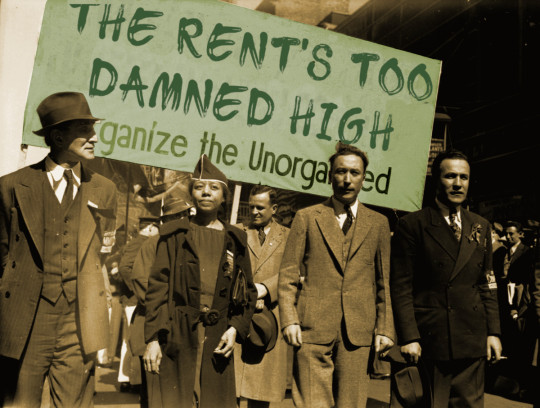
There's a reason Reagan declared war on unions before he declared war on everything else – environmental protection, health care, consumer rights, financial regulation. Unions are how working people fight for a better world for all of us. They're how everyday people come together to resist oligarchy, extraction and exploitation.
Take the 2019 LA teachers' strike. As Jane McAlevey writes in A Collective Bargain, the LA teachers didn't just win higher pay for their members! They also demanded (and got) an end to immigration sweeps of parents waiting for their kids at the school gate; a guarantee of green space near every public school in the city; and on-site immigration counselors in LA schools:
https://pluralistic.net/2023/04/23/a-collective-bargain/
Unionization is enjoying an historic renaissance. The Hot Labor Summer transitioned to an Eternal Labor September, and it's still going strong, with UAW president Shawn Fain celebrating his members victory over the Big Three automakers by calling for a 2028 general strike:
https://www.teenvogue.com/story/uaw-general-strike-no-class
The rising labor movement has powerful allies in the Biden Administration. NLRB general counsel Jennifer Abruzzo is systematically gutting the "union avoidance" playbook. She's banned the use of temp-work app blacklists that force workers to cross picket lines:
https://pluralistic.net/2023/07/30/computer-says-scab/#instawork
She's changed the penalty for bosses who violate labor law during union drives. It used to be the boss would pay a fine, which was an easy price to pay in exchange for killing your workers' union. Now, the penalty is automatic recognition of the union:
https://pluralistic.net/2023/09/06/goons-ginks-and-company-finks/#if-blood-be-the-price-of-your-cursed-wealth
And while the law doesn't allow Abruzzo to impose a contract on companies that refuse to bargain their unions, she's set to force those companies to honor other employers' union contracts until they agree to a contract with their own workers:
https://onlabor.org/gc-abruzzo-just-asked-the-nlrb-to-overturn-ex-cell-o-heres-why-that-matters/
She's also nuking TRAPs, the deals that force workers to repay their employers for their "training expenses" if they have the audacity to quit and get a better job somewhere else:
https://pluralistic.net/2023/09/14/prop-22-never-again/#norms-code-laws-markets
(As with every aspect of the Biden White House, its labor policy is contradictory and self-defeating, with other Biden appointees working to smash worker power, including when Biden broke the railworkers' strike:)
https://pluralistic.net/2023/09/18/co-determination/#now-make-me-do-it
A surging labor movement opens up all kinds of possibilities for a better world. Writing for the Law and Political Economy Project, UNITE Here attorney Zoe Tucker makes the case for unions as a way out of America's brutal housing crisis:
https://lpeproject.org/blog/why-unions-should-join-the-housing-fight/
She describes how low-waged LA hotel workers have been pushed out of neighborhoods close to their jobs, with UNITE Here members commuting three hours in each direction, starting their work-days at 3AM in order to clock in on time:
https://twitter.com/MorePerfectUS/status/1669088899769987079
UNITE Here members are striking against 50 hotels in LA and Orange County, and their demands include significant cost-of-living raises. But more money won't give them back the time they give up to those bruising daily commutes. For that, unions need to make housing itself a demand.
As Tucker writes, most workers are tenants and vice-versa. What's more, bad landlords are apt to be bad bosses, too. Stepan Kazaryan, the same guy who owns the strip club whose conditions were so bad that it prompted the creation of Equity Strippers NoHo, the first strippers' union in a generation, is also a shitty landlord whose tenants went on a rent-strike:
https://pluralistic.net/2023/05/20/the-missing-links/#plunderphonics
So it was only natural that Kazaryan's tenants walked the picket line with the Equity Stripper Noho workers:
https://twitter.com/glendaletenants/status/1733290276599570736?s=46
While scumbag bosses/evil landlords like Kazaryan deal out misery retail, one apartment building at a time, the wholesale destruction of workers' lives comes from private equity giants who are the most prolific source of TRAPs, robo-scabbing apps, illegal union busting, and indefinite contract delays – and these are the very same PE firms that are buying up millions of single-family homes and turning them into slums:
https://pluralistic.net/2022/02/08/wall-street-landlords/#the-new-slumlords
Tucker's point is that when a worker clocks out of their bad job, commutes home for three hours, and gets back to their black-mold-saturated, overpriced apartment to find a notice of a new junk fee (like a surcharge for paying your rent in cash, by check, or by direct payment), they're fighting the very same corporations.
Unions who defend their workers' right to shelter do every tenant a service. A coalition of LA unions succeeded in passing Measure ULA, which uses a surcharge on real estate transactions over $5m to fund "the largest municipal housing program in the country":
https://unitedtohousela.com/app/uploads/2022/05/LA_City_Affordable_Housing_Petition_H.pdf
LA unions are fighting for rules to limit Airbnbs and other platforms that transform the city's rental stock into illegal, unlicensed hotels:
https://upgo.lab.mcgill.ca/publication/strs-in-los-angeles-2022/Wachsmuth_LA_2022.pdf
And the hotel workers organized under UNITE Here are fighting their own employers: the hoteliers who are aggressively buying up residences, evicting their long-term tenants, tearing down the building and putting up a luxury hotel. They got LA council to pass a law requiring hotels to build new housing to replace any residences they displace:
https://www.latimes.com/california/story/2023-11-28/airbnb-operators-would-need-police-permit-in-l-a-under-proposed-law
UNITE Here is bargaining for a per-room hotel surcharge to fund housing specifically for hotel workers, so the people who change the sheets and clean the toilets don't have to waste six hours a day commuting to do so.
Labor unions and tenant unions have a long history of collaboration in the USA. NYC's first housing coop was midwifed by the Amalgamated Clothing Workers of America in 1927. The Penn South coop was created by the International Ladies Garment Workers’ Union. The 1949 Federal Housing Act passed after American unions pushed hard for it:
http://www.peterdreier.com/wp-content/uploads/2014/07/Labors-Love-Lost.pdf
It goes both ways. Strong unions can create sound housing – and precarious housing makes unions weaker. Remember during the Hollywood writers' strike, when an anonymous studio ghoul told the press the plans was to "allow things to drag on until union members start losing their apartments and losing their houses?"
Vienna has the most successful housing in any major city in the world. It's the city where people of every income and background live in comfort without being rent-burdened and without worry about eviction, mold, or leaks. That's the legacy of Red Vienna, the Austrian period of Social Democratic Workers' Party rule and built vast tracts of high-quality public housing. The system was so robust that it rebounded after World War II and continues to this day:
https://www.politico.eu/article/vienna-social-housing-architecture-austria-stigma/
Today, the rest of the world is mired in a terrible housing crisis. It's not merely that the rent's too damned high (though it is) – housing precarity is driving dangerous political instability:
https://pluralistic.net/2021/06/06/the-rents-too-damned-high/
Turning the human necessity of shelter into a market commodity is a failure. The economic orthodoxy that insists that public housing, rent control, and high-density zoning will lead to less housing has failed. rent control works:
https://pluralistic.net/2023/05/16/mortgages-are-rent-control/#housing-is-a-human-right-not-an-asset
Leaving housing to the market only produces losers. If you have the bad luck to invest everything you have into a home in a city that contracts, you're wiped out. If you have the bad luck into invest everything into a home in a "superstar city" where prices go up, you also lose, because your city becomes uninhabitable and your children can't afford to live there:
https://pluralistic.net/2021/09/27/lethal-dysfunction/#yimby
A strong labor movement is the best chance we have for breaking the housing deadlock. And housing is just for starters. Labor is the key to opening every frozen-in-place dysfunction. Take care work: the aging, increasingly chronically ill American population is being tortured and murdered by private equity hospices, long-term care facilities and health services that have been rolled up by the same private equity firms that destroyed work and housing:
https://pluralistic.net/2023/04/26/death-panels/#what-the-heck-is-going-on-with-CMS
In her interview with Capital & Main's Jessica Goodheart, National Domestic Workers Alliance president Ai-jen Poo describes how making things better for care workers will make things better for everyone:
https://prospect.org/labor/2023-12-13-labor-leader-ai-jen-poo-interview/
Care work is a "triple dignity investment": first, it makes life better for the worker (most often a woman of color), then, it allows family members of people who need care to move into higher paid work; and of course, it makes life better for people who need care: "It delivers human potential and agency. It delivers a future workforce. It delivers quality of life."
The failure to fund care work is a massive driver of inequality. America's sole federal public provision for care is Medicaid, which only kicks in after a family it totally impoverished. Funding care with tax increases polls high with both Democrats and Republicans, making it good politics:
https://www.dataforprogress.org/blog/2021/4/7/voters-support-investing-in-the-care-economy
Congress stripped many of the care provisions from Build Back Better, missing a chance for an "unprecedented, transformational investment in care." But the administrative agencies picked up where Congress failed, following a detailed executive order that identifies existing, previously unused powers to improve care in America. The EO "expands access to care, supports family caregivers and improves wages and conditions for the workforce":
https://www.whitehouse.gov/briefing-room/presidential-actions/2023/04/18/executive-order-on-increasing-access-to-high-quality-care-and-supporting-caregivers/
States are also filling the void. Washington just created a long-term care benefit:
https://apnews.com/article/washington-long-term-care-tax-disability-cb54b04b025223dbdba7199db1d254e4
New Mexicans passed a ballot initiative that establishes permanent funding for child care:
https://www.cwla.org/new-mexico-votes-for-child-care/
New York care workers won a $3/hour across the board raise:
https://inequality.org/great-divide/new-york-budget-fair-pay-home-care/
The fight is being led by women of color, and they're kicking ass – and they're doing it through their unions. Worker power is the foundation that we build a better world upon, and it's surging.

If you'd like an essay-formatted version of this post to read or share, here's a link to it on pluralistic.net, my surveillance-free, ad-free, tracker-free blog:
https://pluralistic.net/2023/12/13/i-want-a-roof-over-my-head/#and-bread-on-the-table
#pluralistic#labor#hot labor summer#eternal labor september#jane mcalevey#los angeles#weaponized shelter#housing#airbnb#equity strip noho#tenants unions#red vienna#jennifer abruzzo#nlrb#the rent's too damned high
1K notes
·
View notes
Text
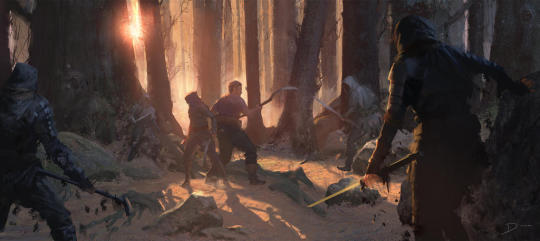
Monsters Reimagined: Bandits
As a game of heroic fantasy that centers so primarily on combat, D&D is more often than not a game about righteous violence, which is why I spend so much time thinking about the targets of that violence. Every piece of media made by humans is a thing created from conscious or unconscious design, it’s saying something whether or not its creators intended it to do so.
Tolkien made his characters peaceloving and pastoral, and coded his embodiment of evil as powerhungry, warlike, and industrial. When d&d directly cribbed from Tolkien's work it purposely changed those enemies to be primitive tribespeople who were resentful of the riches the “civilized” races possessed. Was this intentional? None can say, but as a text d&d says something decidedly different than Tolkien.
That's why today I want to talk about bandits, the historical concept of being an “outlaw”, and how media uses crime to “un-person” certain classes of people in order to give heroes a target to beat up.
Tldr: despite presenting bandits as a generic threat, most d&d scenarios never go into detail about what causes bandits to exist, merely presuming the existence of outlaws up to no good that the heroes should feel no qualms about slaughtering. If your story is going to stand up to the scrutiny of your players however, you need to be aware of WHY these individuals have been driven to banditry, rather than defaulting to “they broke the law so they deserve what’s coming to them.”
I got to thinking about writing this post when playing a modded version of fallout 4, an npc offhndedly mentioned to me that raiders (the postapoc bandit rebrand) were too lazy to do any farming and it was good that I’d offed them by the dozens so that they wouldn’t make trouble for those that did.
That gave me pause, fallout takes place in an irradiated wasteland where folks struggle to survive but this mod was specifically about rebuilding infrastructure like farms and ensuring people had enough to get by. Lack of resources to go around was a specific justification for why raiders existed in the first place, but as the setting became more arable the mod-author had to create an excuse why the bandit’s didn’t give up their violent ways and start a nice little coop, settling on them being inherently lazy , dumb, and psychopathic.
This is exactly how d&d has historically painted most of its “monstrous humanoid” enemies. Because the game is ostensibly about combat the authors need to give you reasons why a peaceful solution is impossible, why the orcs, goblins, gnolls (and yes, bandits), can’t just integrate with the local town or find a nice stretch of wilderness to build their own settlement on and manage in accordance with their needs. They go so far in this justification that they end up (accidently or not) recreating a lot of IRL arguments for persecution and genocide.
Bandits are interesting because much like cultists, it’s a descriptor that’s used to unperson groups of characters who would traditionally be inside the “not ontologically evil” bubble that’s applied to d&d’s protagonists. Break the law or worship the wrong god says d&d and you’re just as worth killing as the mindless minions of darkness, your only purpose to serve as a target of the protagonist’s righteous violence.
The way we get around this self-justification pitfall and get back to our cool fantasy action game is to relentlessly question authority, not only inside the game but the authors too. We have to interrogate anyone who'd show us evil and direct our outrage a certain way because if we don't we end up with crusades, pogroms, and Qanon.
With that ethical pill out of the way, I thought I’d dive into a listing of different historical groups that we might call “Bandits” at one time or another and what worldbuilding conceits their existence necessitates.
Brigands: By and large the most common sort of “bandit” you’re going to see are former soldiers left over from wars, often with a social gap between them and the people they’re raiding that prevents reintegration ( IE: They’re from a foreign land and can’t speak the local tongue, their side lost and now they’re considered outlaws, they’re mercenaries who have been stiffed on their contract). Justifying why brigands are out brigading is as easy as asking yourself “What were the most recent conflicts in this region and who was fighting them?”. There’s also something to say about how a life of trauma and violence can be hard to leave even after the battle is over, which is why you historically tend to see lots of gangs and paramilitary groups pop up in the wake of conflict.
Raiders: fundamentally the thing that has caused cultures to raid eachother since the dawn of time is sacristy. When the threat of starvation looms it’s far easier to justify potentially throwing your life away if it means securing enough food to last you and those close to you through the next year/season/day. Raider cultures develop in biomes that don’t support steady agriculture, or in times where famine, war, climate change, or disease make the harvests unreliable. They tend to target neighboring cultures that DO have reliable harvests which is why you frequently see raiders emerging from “the barbaric frontier” to raid “civilization” that just so happens to occupy the space of a reliably fertile river valley. When thinking about including raiders in your story, consider what environmental forces have caused this most recent and previous raids, as well as consider how frequent raiding has shaped the targeted society. Frequent attacks by raiders is how we get walled palaces and warrior classes after all, so this shit is important.
Slavers: Just like raiding, most cultures have engaged in slavery at one point or another, which is a matter I get into here. While raiders taking captives is not uncommon, actively attacking people for slaves is something that starts occurring once you have a built up slave market, necessitating the existence of at least one or more hierarchical societies that need more disposable workers than then their lower class is capable of providing. The roman legion and its constant campaigns was the apparatus by which the imperium fed its insatiable need for cheap slave labor. Subsistence raiders generally don’t take slaves en masse unless they know somewhere to sell them, because if you’re having trouble feeding your own people you’re not going to capture more ( this is what d&d gets wrong about monstrous humanoids most of the time).
Tax Farmers: special mention to this underused classic, where gangs of toughs would bid to see who could collect money for government officials, and then proceed to ransack the realm looking to squeeze as much money out of the people as possible. This tends to happen in areas where the state apparatus is stretched too thin or is too lighthanded to have established enduring means of funding. Tax farmers are a great one-two punch for campaigns where you want your party to be set up against a corrupt authority: our heroes defeat the marauding bandits and then oh-no, turns out they were not only sanctioned by the government but backed by an influential political figure who you’ve just punched in the coinpurse. If tax farming exists it means the government is strong enough to need a yearly budget but not so established (at least in the local region) that it’s developed a reliably peaceful method of maintaining it.
Robber Baron: Though the term is now synonymous with ruthless industrialists, it originated from the practice of shortmidned petty gentry (barons and knights and counts and the like) going out to extort and even rob THEIR OWN LANDS out of a desire for personal enrichment/boredom. Schemes can range from using their troops to shake down those who pass through their domain to outright murdering their own peasants for sport because you haven’t gotten to fight in a war for a while. Just as any greed or violence minded noble can be a robber baron so it doesn’t take that much of a storytelling leap but I encourage you to channel all your landlord hate into this one.
Rebels: More than just simple outlaws, rebels have a particular cause they’re a part of (just or otherwise) that puts them at odds with the reigning authority. They could violently support a disfavoured political faction, be acting out against a law they think is unjust, or hoping to break away from the authority entirely. Though attacks against those figures of authority are to be expected, it’s all too common for rebels to go onto praying on common folk for the sake of the cause. To make a group of rebels worth having in your campaign pinpoint an issue that two groups of people with their own distinct interests could disagree on, and then ratchet up the tension. Rebels have to be able to beleive in a cause, so they have to have an argument that supports them.
Remnants: Like a hybrid of brigands, rebels, and taxfarmers, Remnants represent a previously legitimate system of authority that has since been replaced but not yet fully disappeared. This can happen either because the local authority has been replaced by something new (feudal nobles left out after a monarchy toppling revolution) or because it has faded entirely ( Colonial forces of an empire left to their own devices after the empire collapses). Remnants often sat at the top of social structures that had endured for generations and so still hold onto the ghost of power ( and the violence it can command) and the traditions that support it. Think about big changes that have happened in your world of late, are the remnants looking to overturn it? Win new privilege for themselves? Go overlooked by their new overlords?
Art
#monsters reimagined#bandits#dnd#dungeons and dragons#d&d#ttprg#pathfinder#heavy topics#monsters reimagined
1K notes
·
View notes
Text
That said, the D&D 3.5 Paladin was bad. It was badly designed, it had bad rules, and in conjunction with the other notoriously bad rule, alignment, it could cause havoc.
Now personally, I never had ANY problems with it in my tabletop games. I played paladins and loved it, and I loved it when other people played paladins, and it was great. But that's because, collectively as a group, we took ONE look at that terrible rule where the paladin's code of conduct prevents them from associating with Evil characters or "someone who consistently offends her moral code", and immediately went, "that's stupid, we ain't doing that, it would ruin the game".
We also didn't love the concept of alignment as a cosmic force, and didn't care for Usually Evil Goblins and Always Evil anything. And when a class's signature ability fully depends on whether creatures are capital E Evil, well that affects storytelling, doesn't it? But we all saw it the same way, and we were happily able to change it without any disagreements. In the end we had a Paladin… similar to 5e now that I think of it: completely ignore the Code's association clause, tailor the Code to personal stance or a specific Order, Detect only fiends and undead and the like, Smite anything you want, Fall only if you really fuck up, and never presume that just because you haven't Fallen yet everything you've ever done is justified and correct and anyone who disagrees with you is objectively wrong.
Basically, there were 2 options in 3.5. You either houseruled and/or handwaved things, and in matters of alignment interpretations erred on the side of "what makes the game go",
OR, you played with Rules As Written, and filled the forums with questions like "should the paladin fall?" (one such thread per week, conservatively), "we got into a fight over the Paladin, what to do?", "is it Evil to pick pockets? because we have a Paladin in the party", "the Assassin uses poison, shouldn't that offend my moral code?", and shit like that. Just... pointless strife, all the time. Again, never happened to me, but I was appalled to read about it, over and over and over.
People got intense with 3.5 Paladins (both pro and against) because it was BADLY DESIGNED and had BAD RULES. Its mechanics forced narrative choices on the entire table, and the only way to make it frictionless was having a party where no one wishes to explore a character's bad side ever, no one does things that aren't bad but WotC branded Evil™ in this or that splatbook, and everyone magically agrees all the time on "what is right and what is wrong" and "what is Lawful and what is Chaotic", which is simply impossible. The most subjective thing in the world (ethics!) was presented as an objective cosmic force, and how you interpreted it would determine how much damage the Paladin deals in combat, and whether the Paladin could keep associating with the party, and if the Paladin is still a Paladin. And all that in a game, let's not forget, whose basic, fundamental premise is "kill things and take their stuff". I'm sorry, this is tremendously stupid. It's the WORST design.
I know that for some people it worked as written, and good for them, but for the many many people it didn't work, well it's obvious why.
540 notes
·
View notes